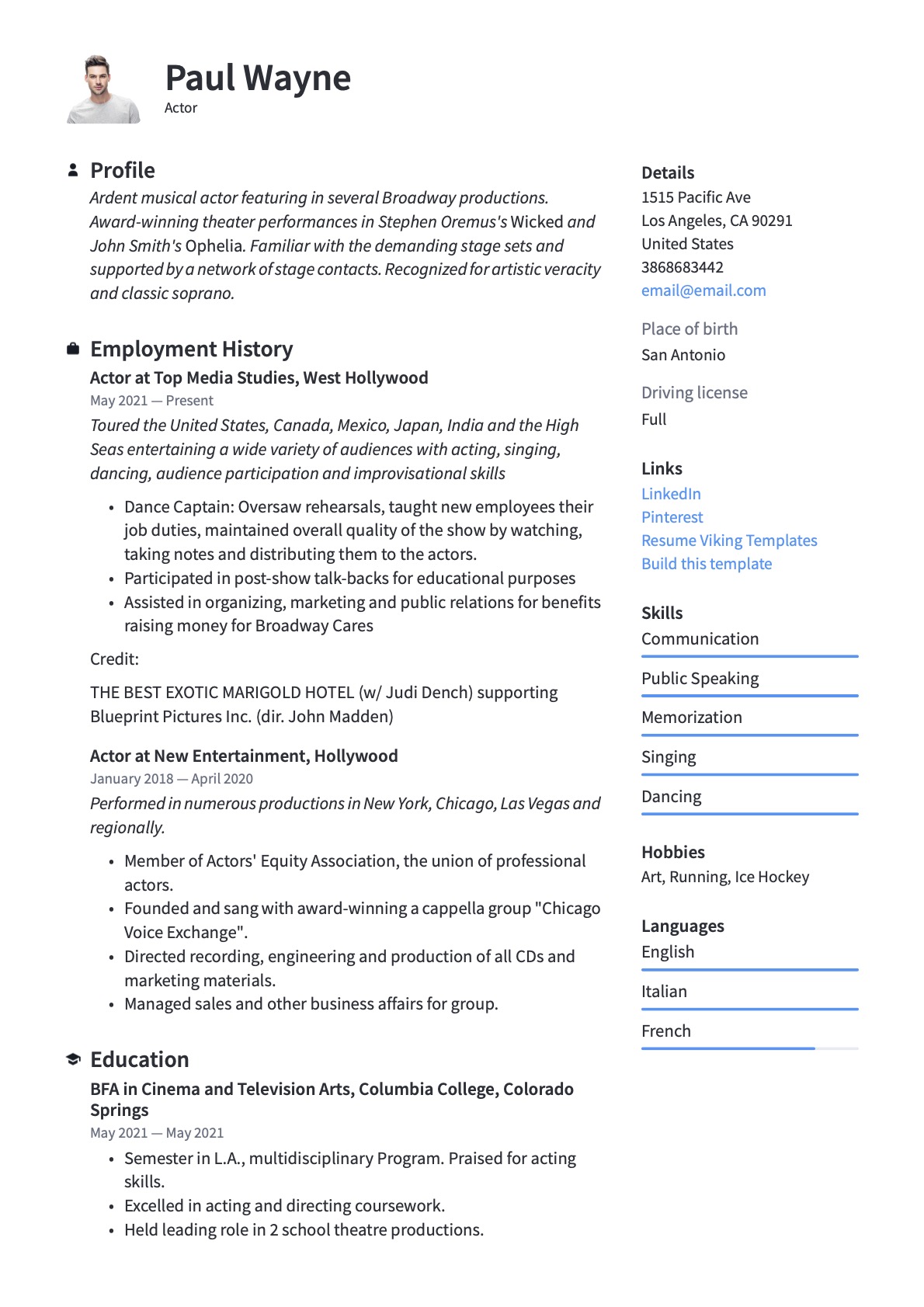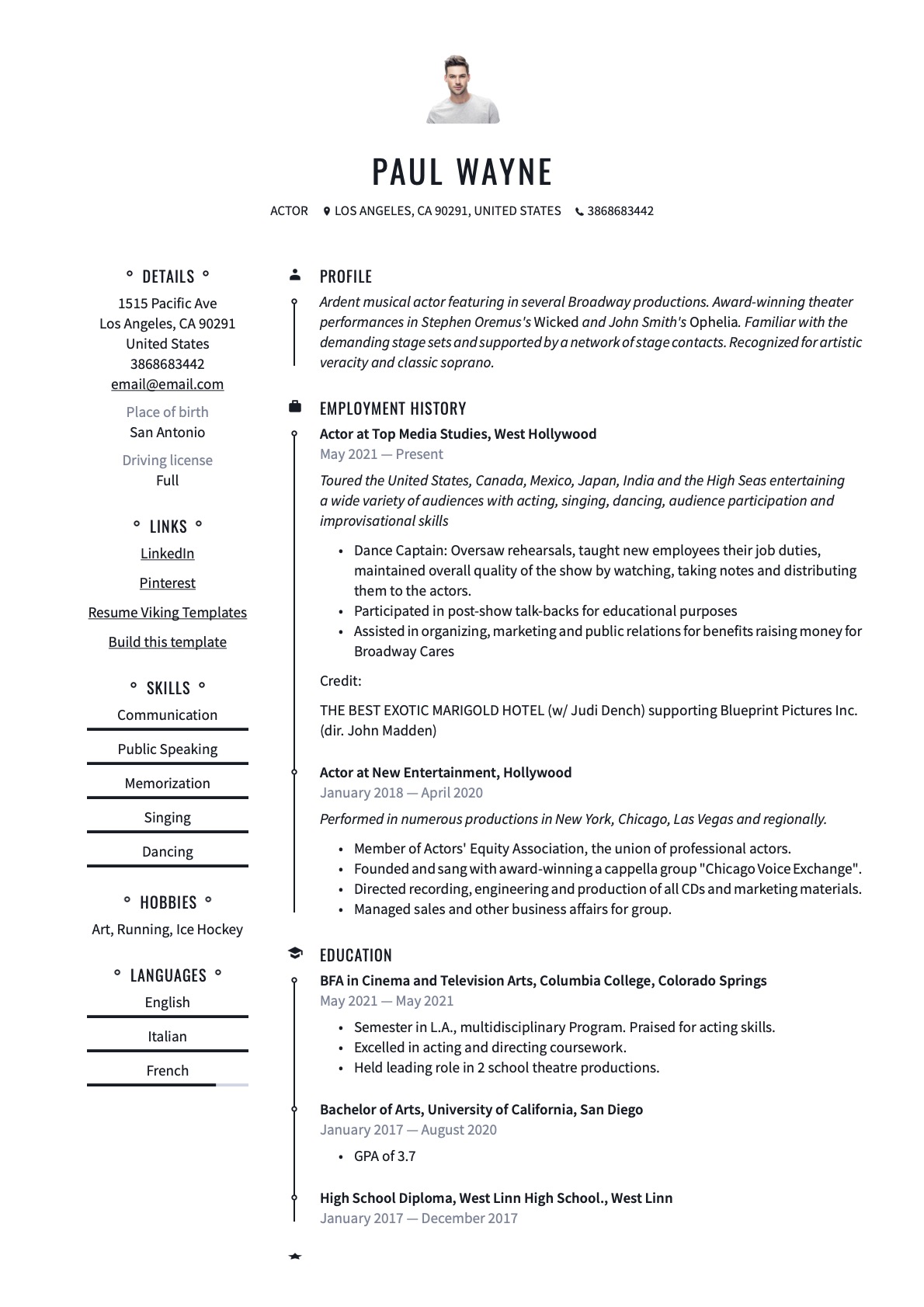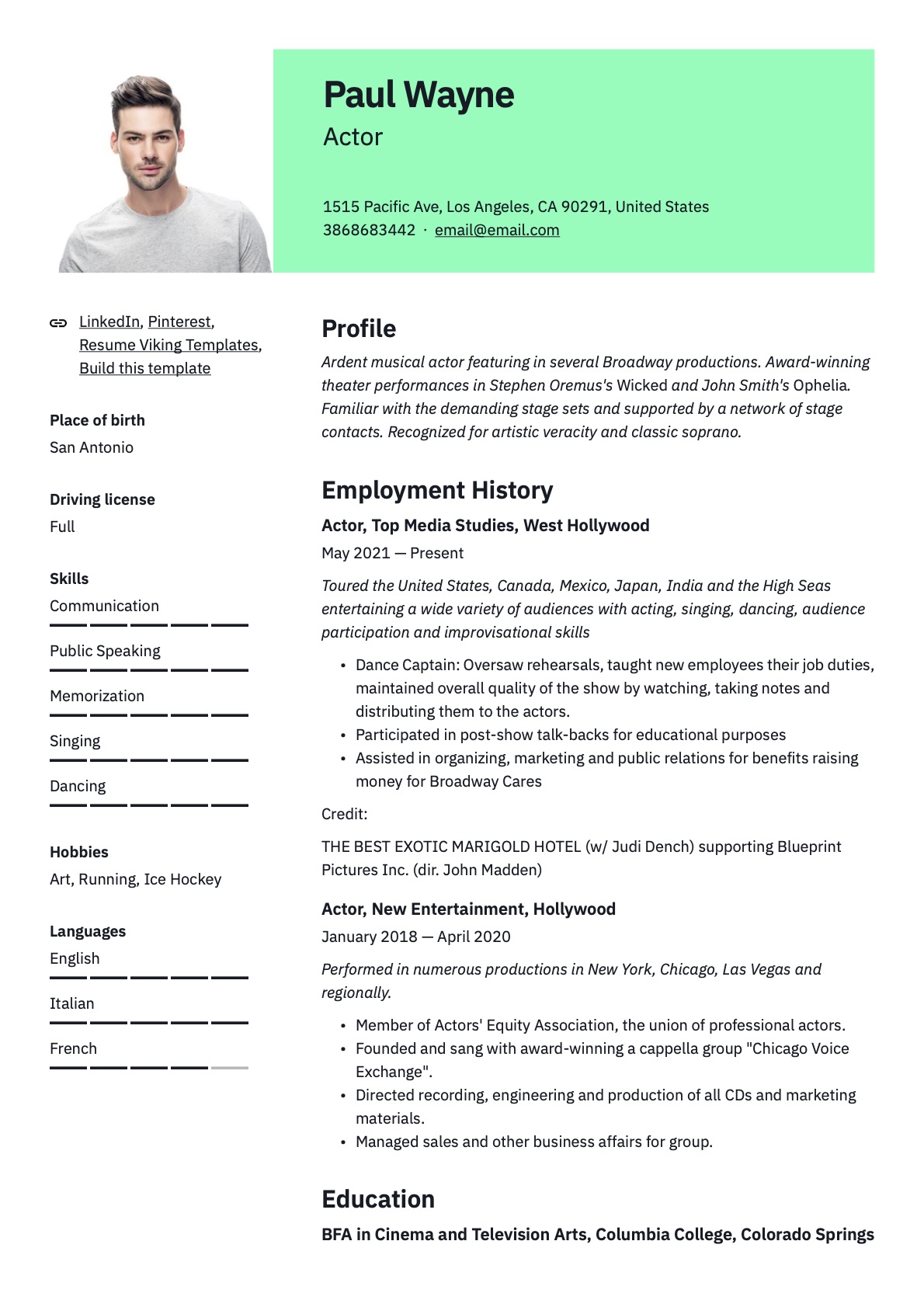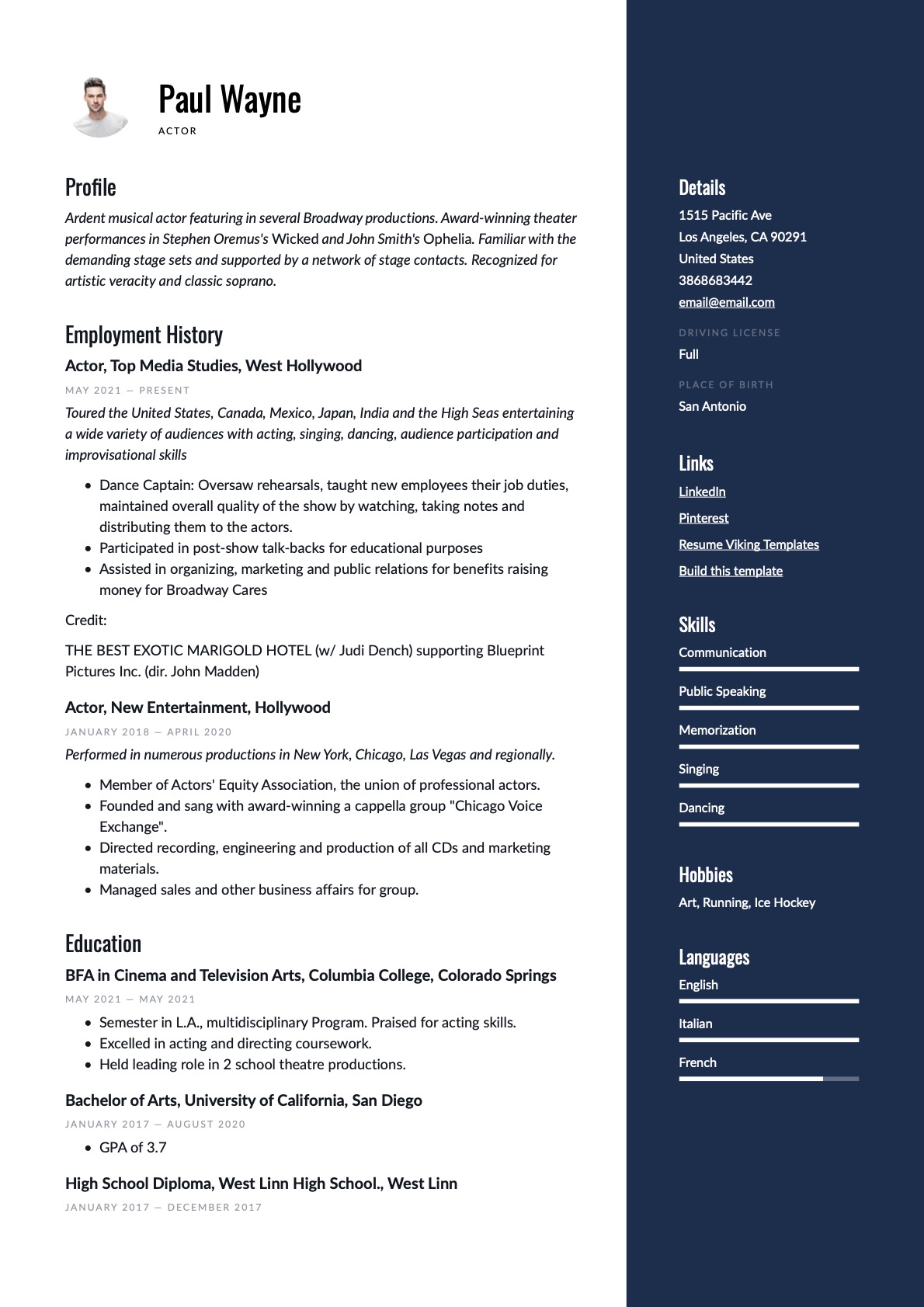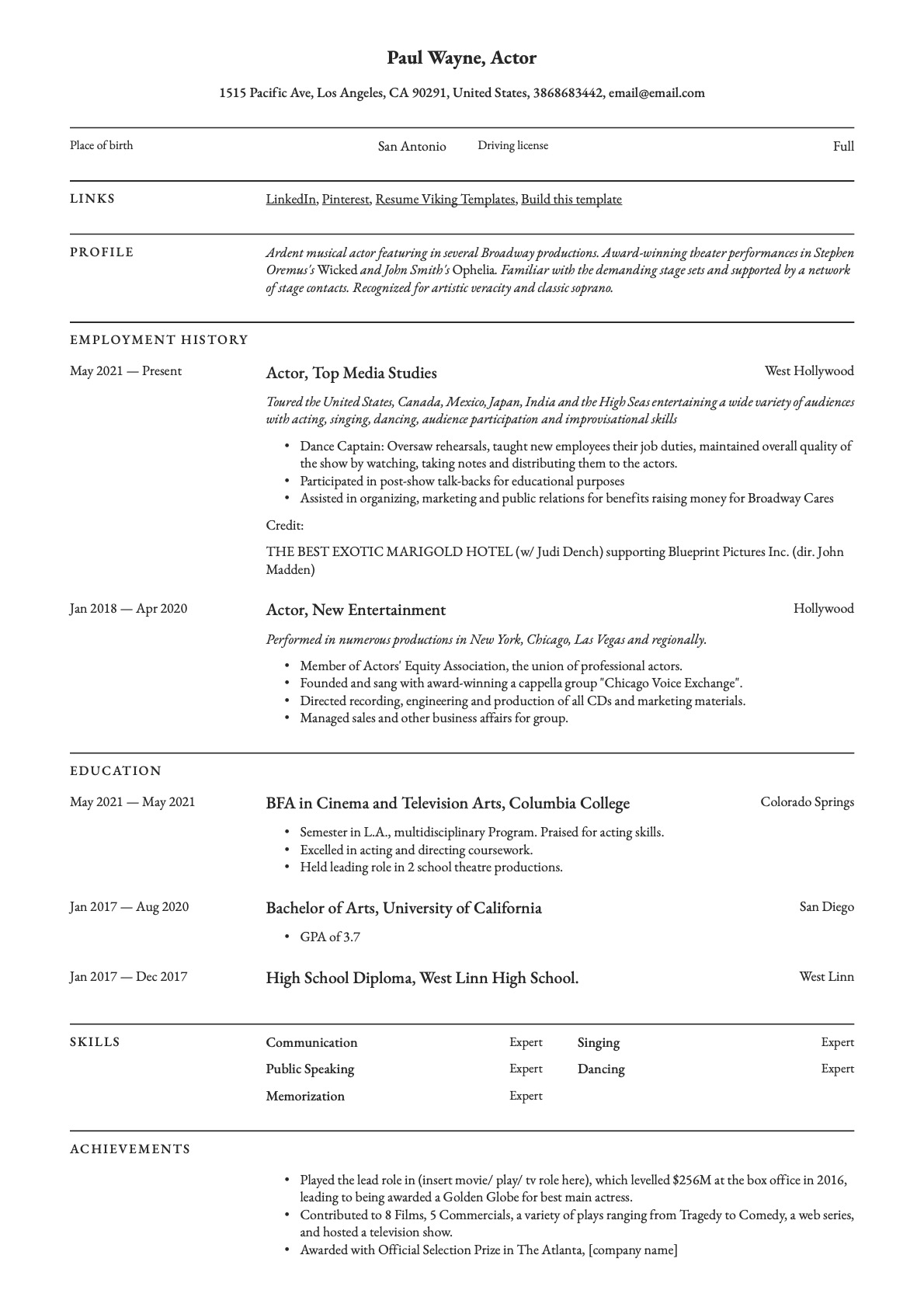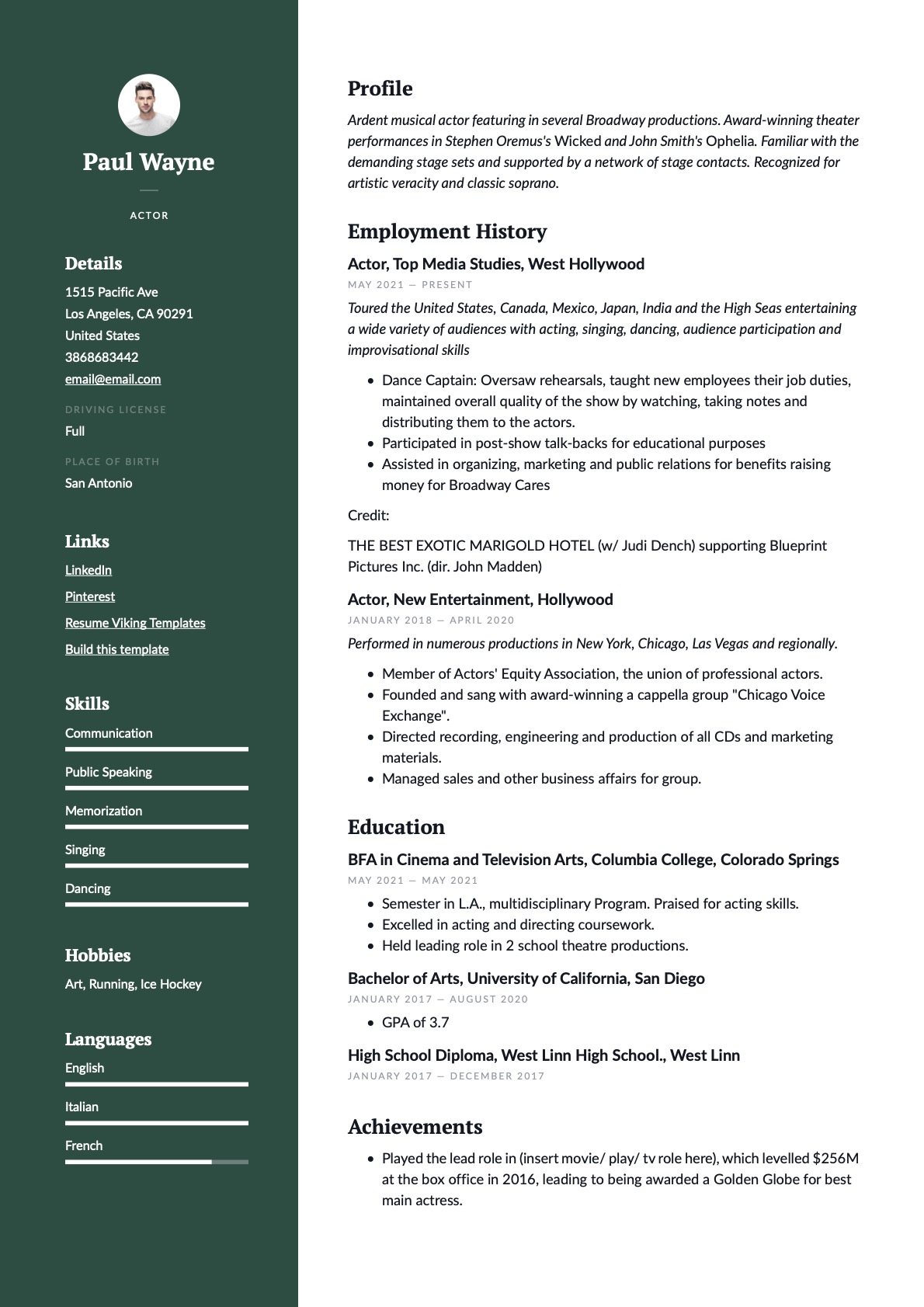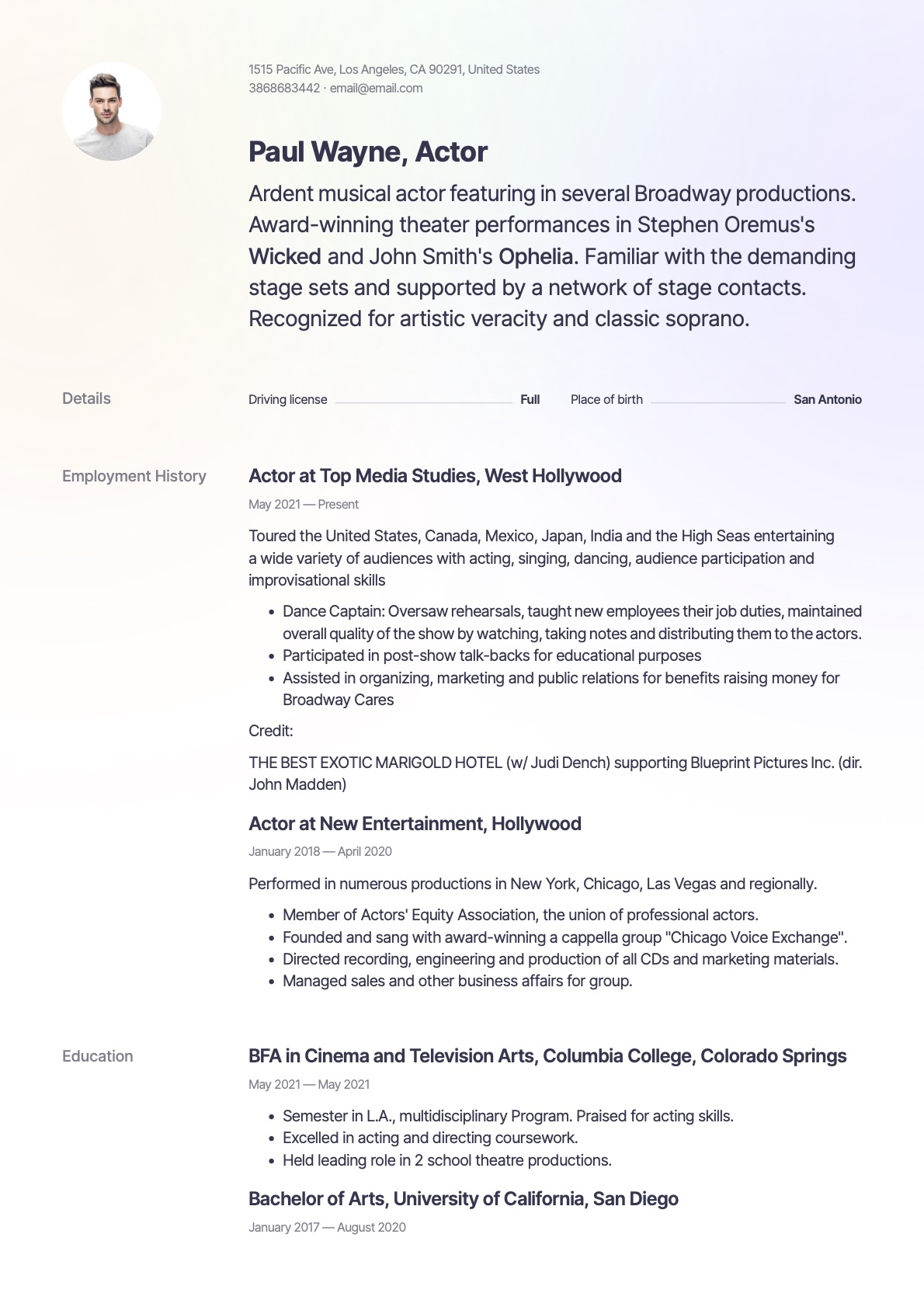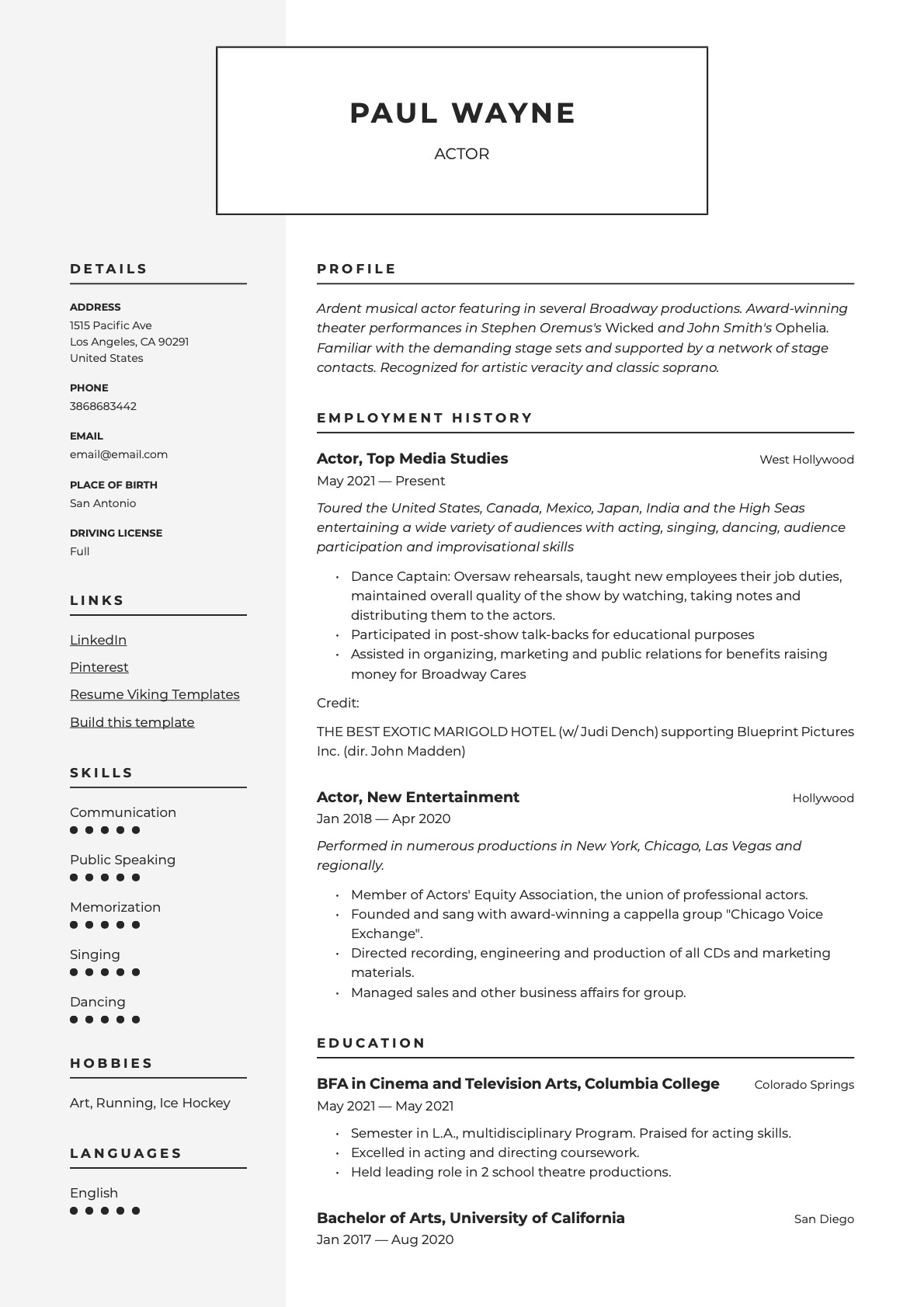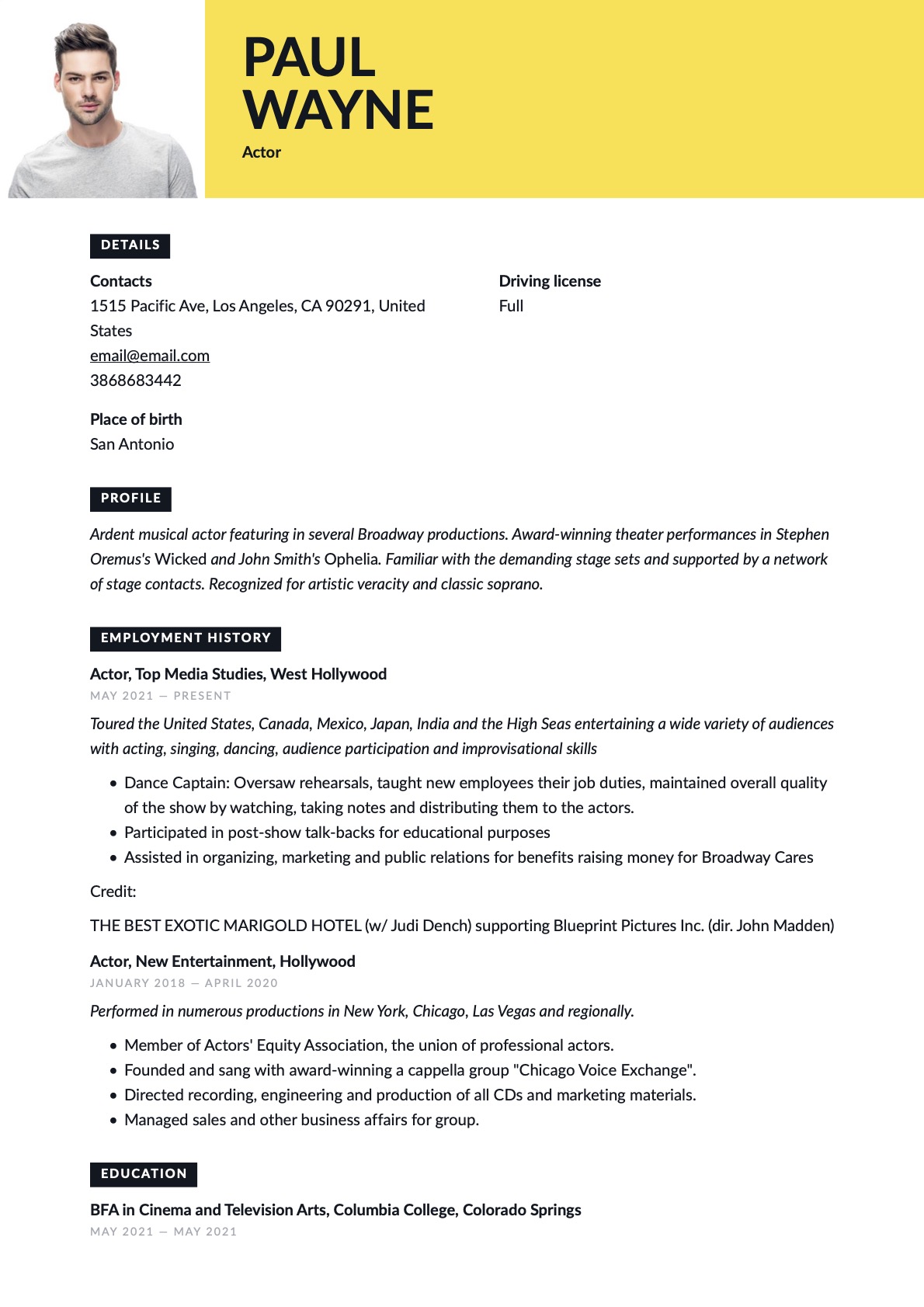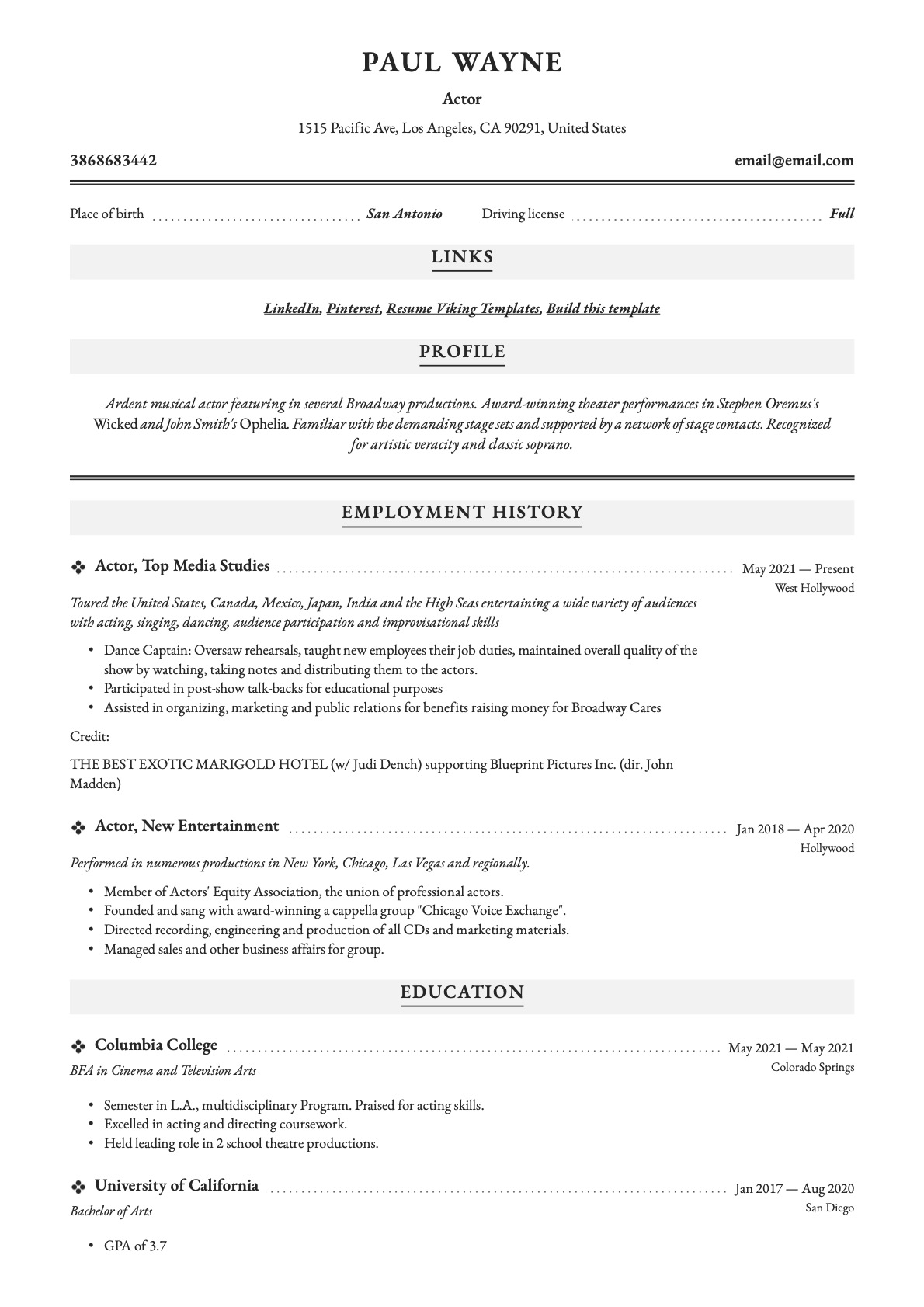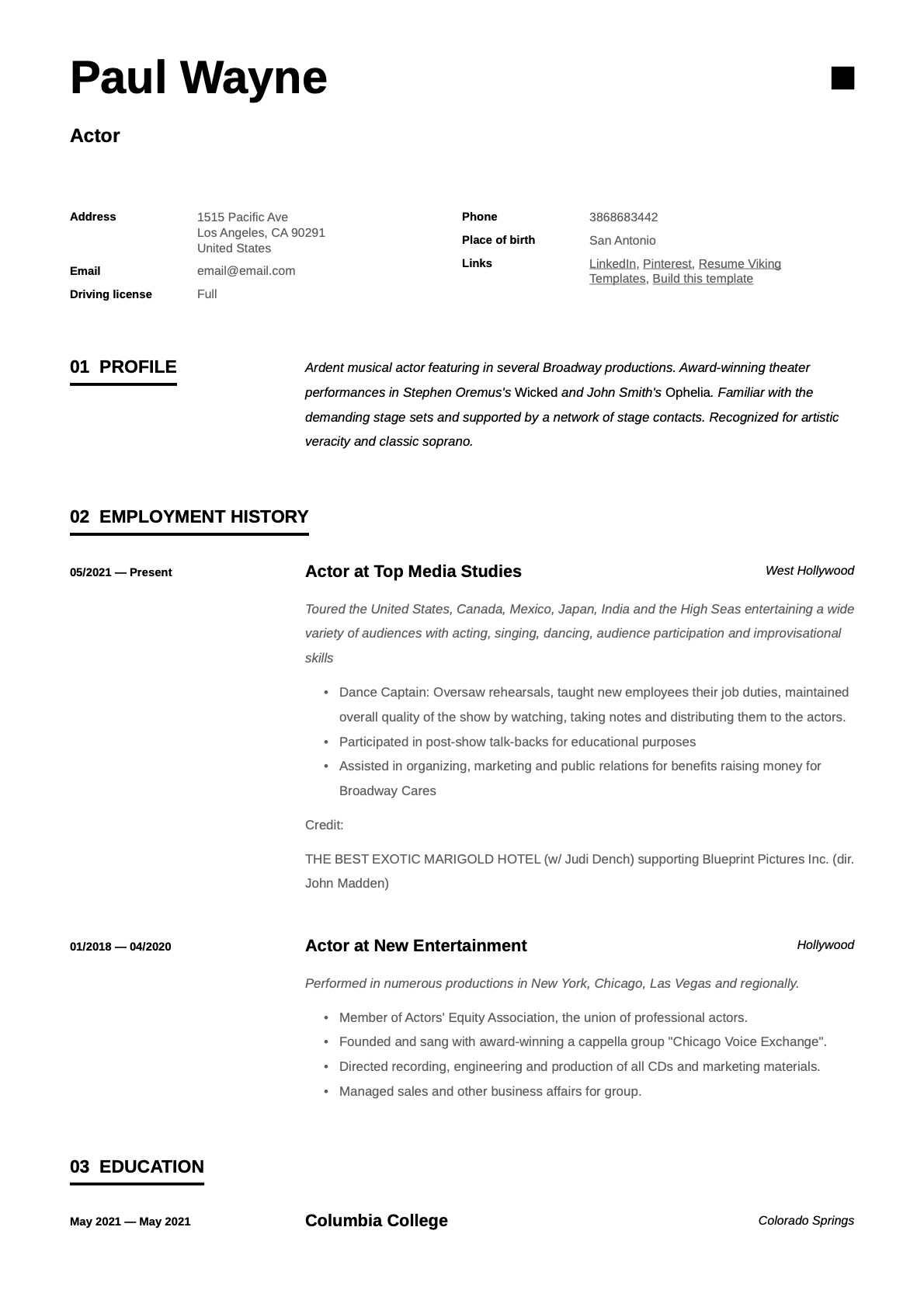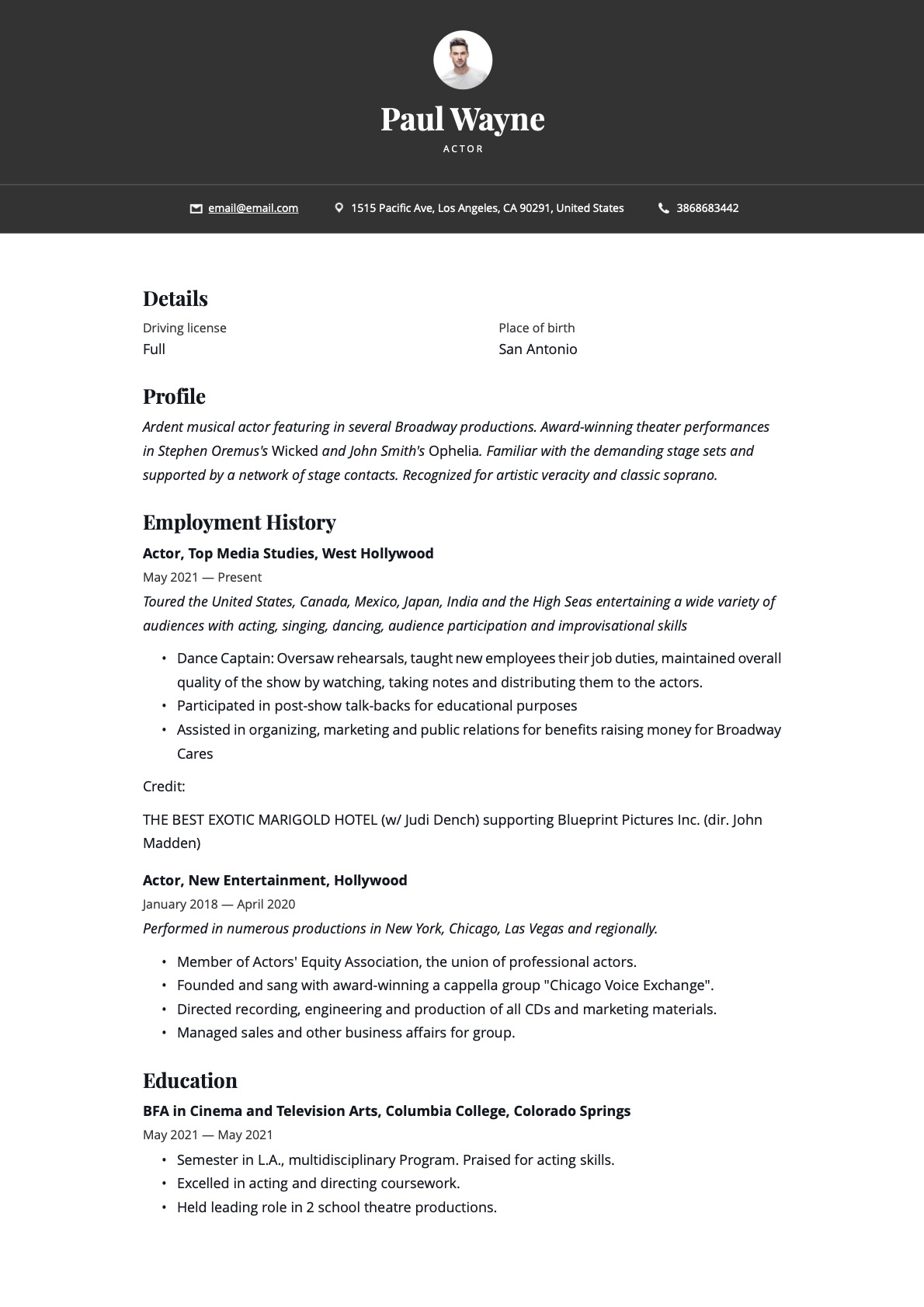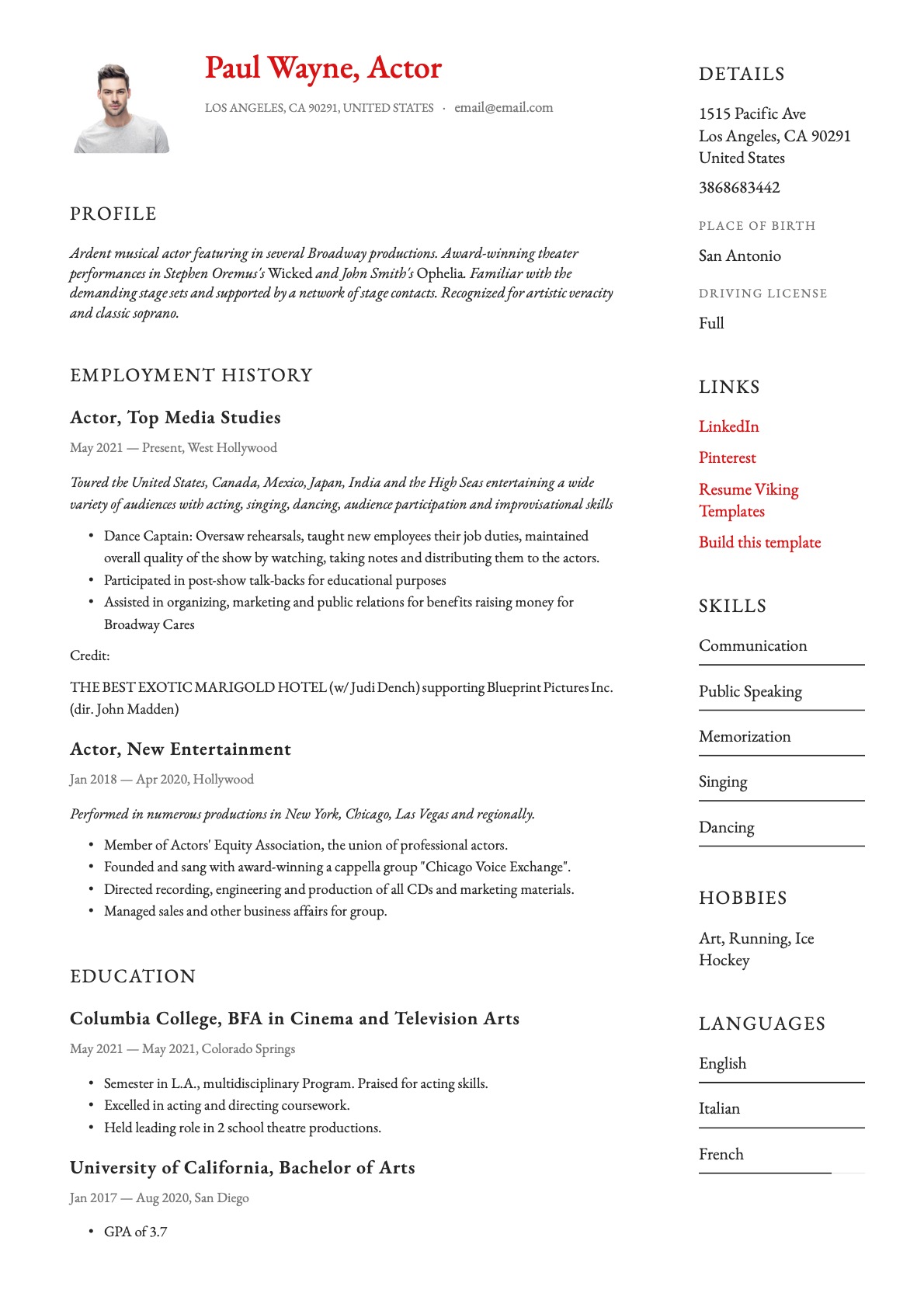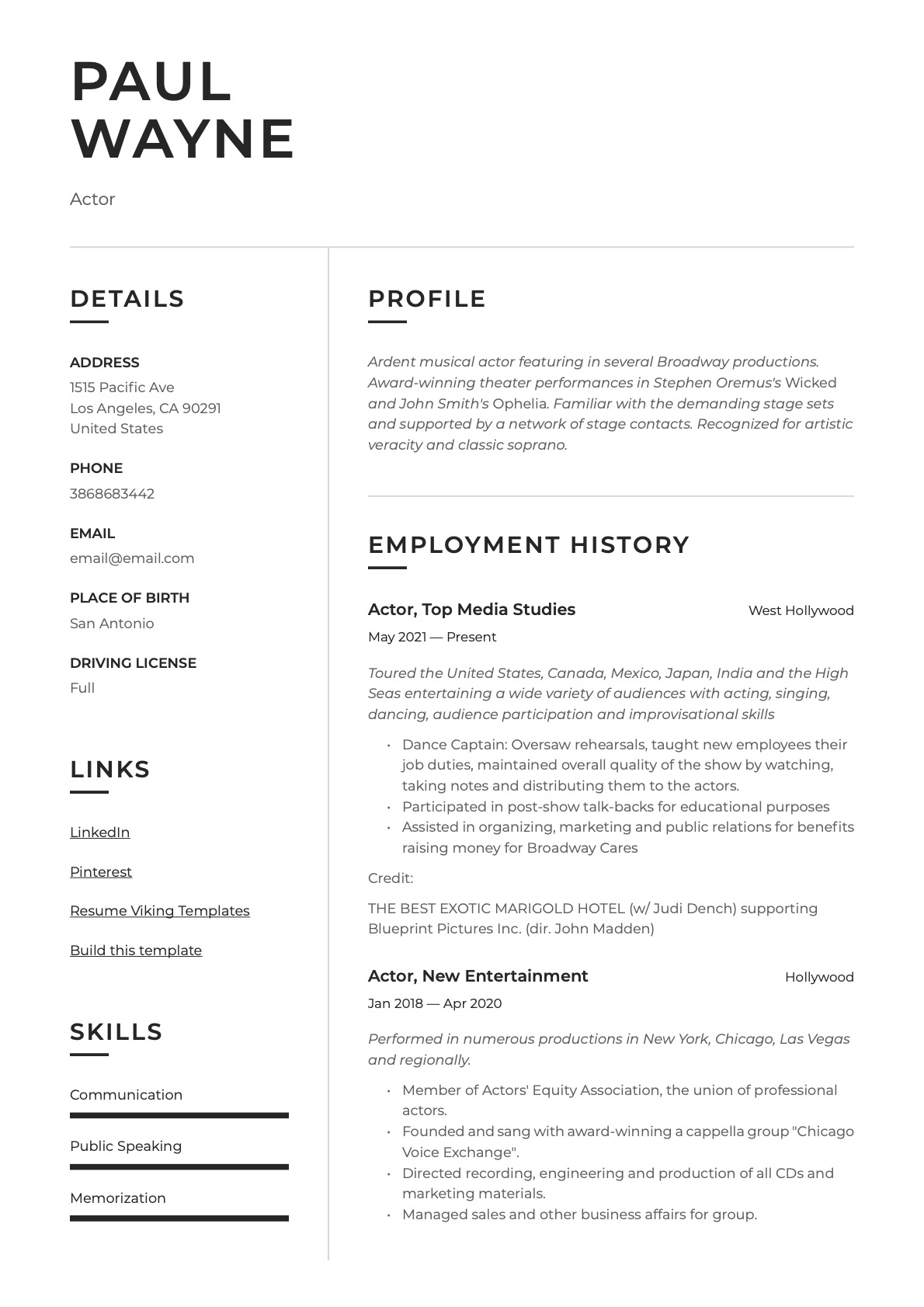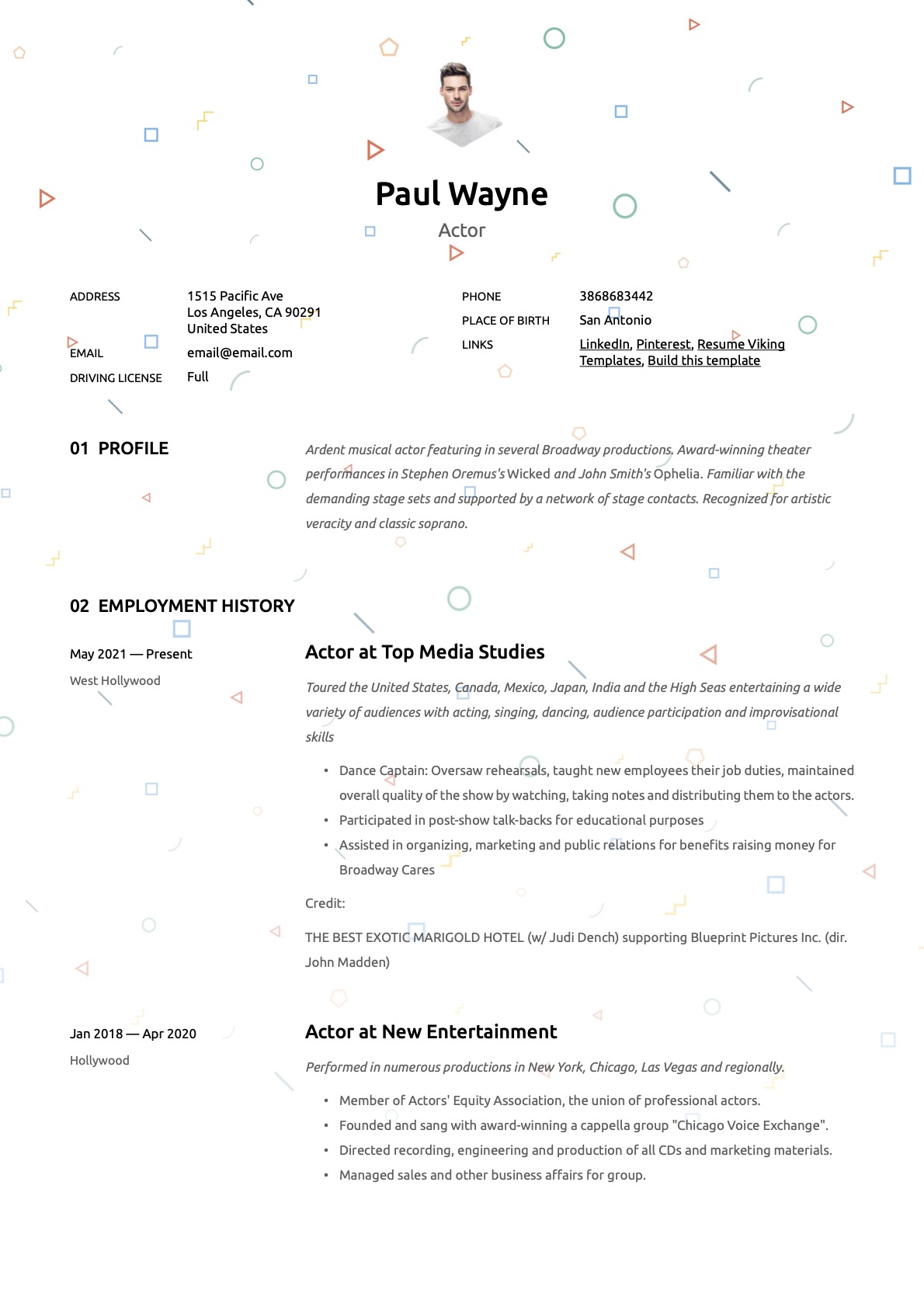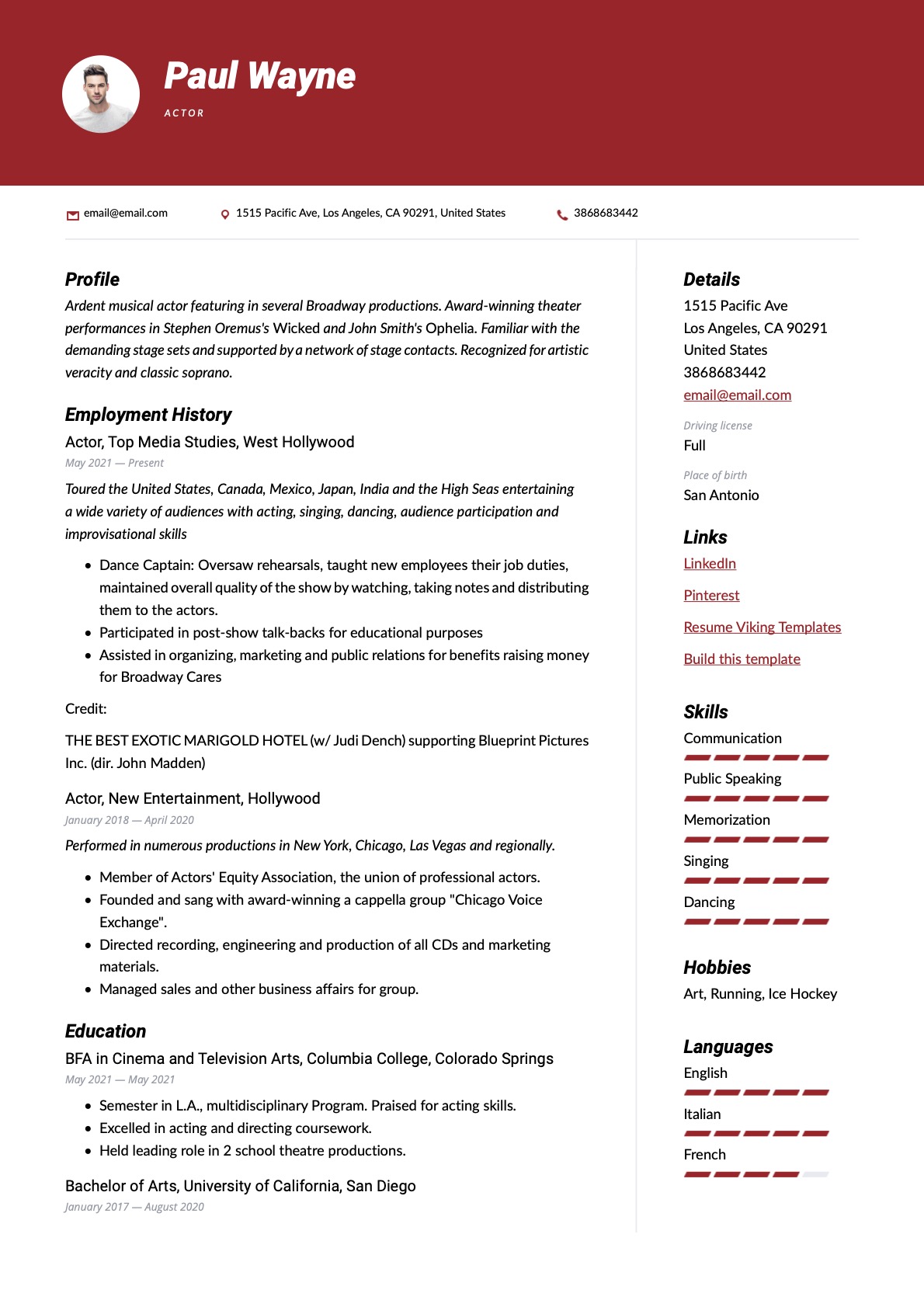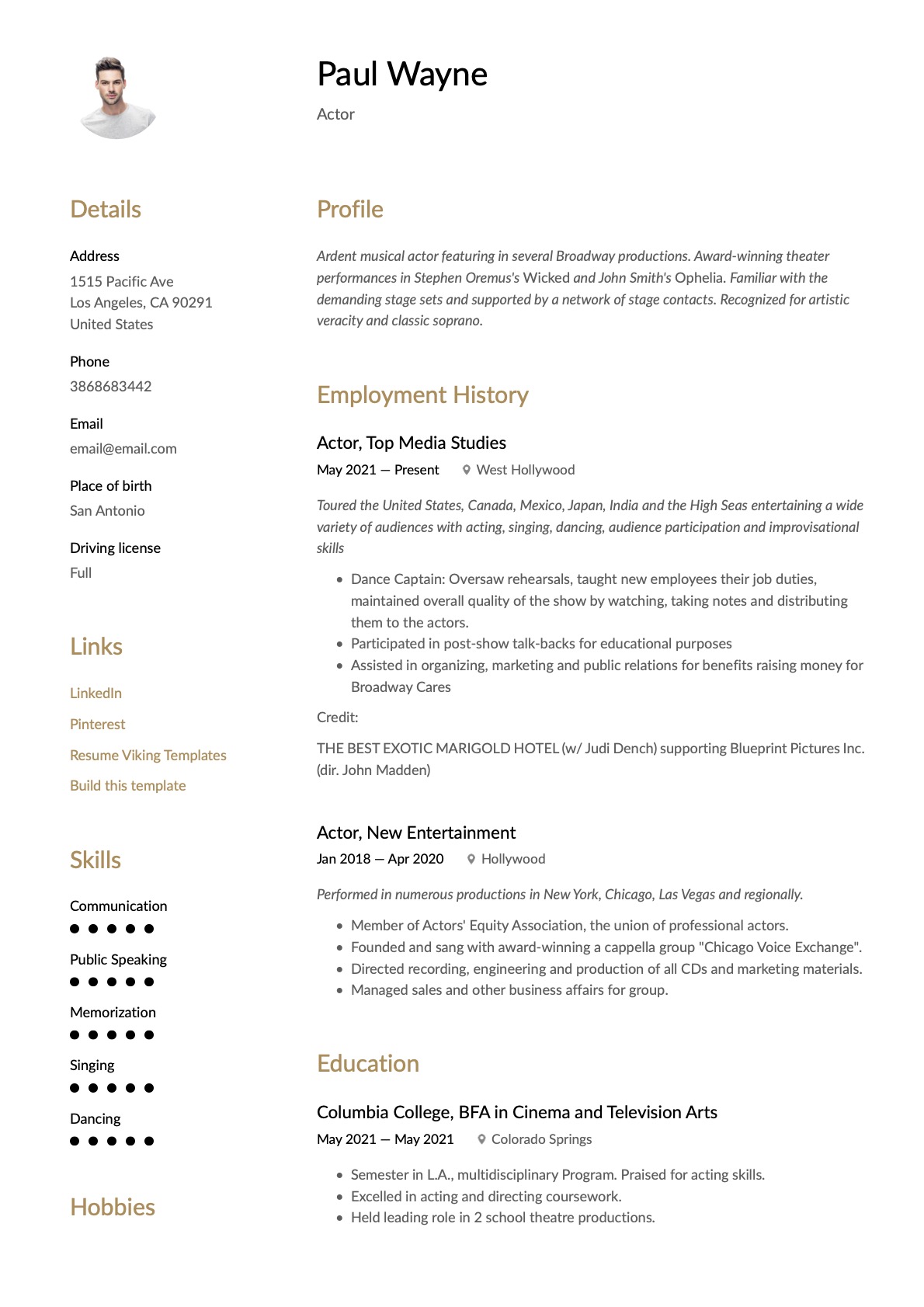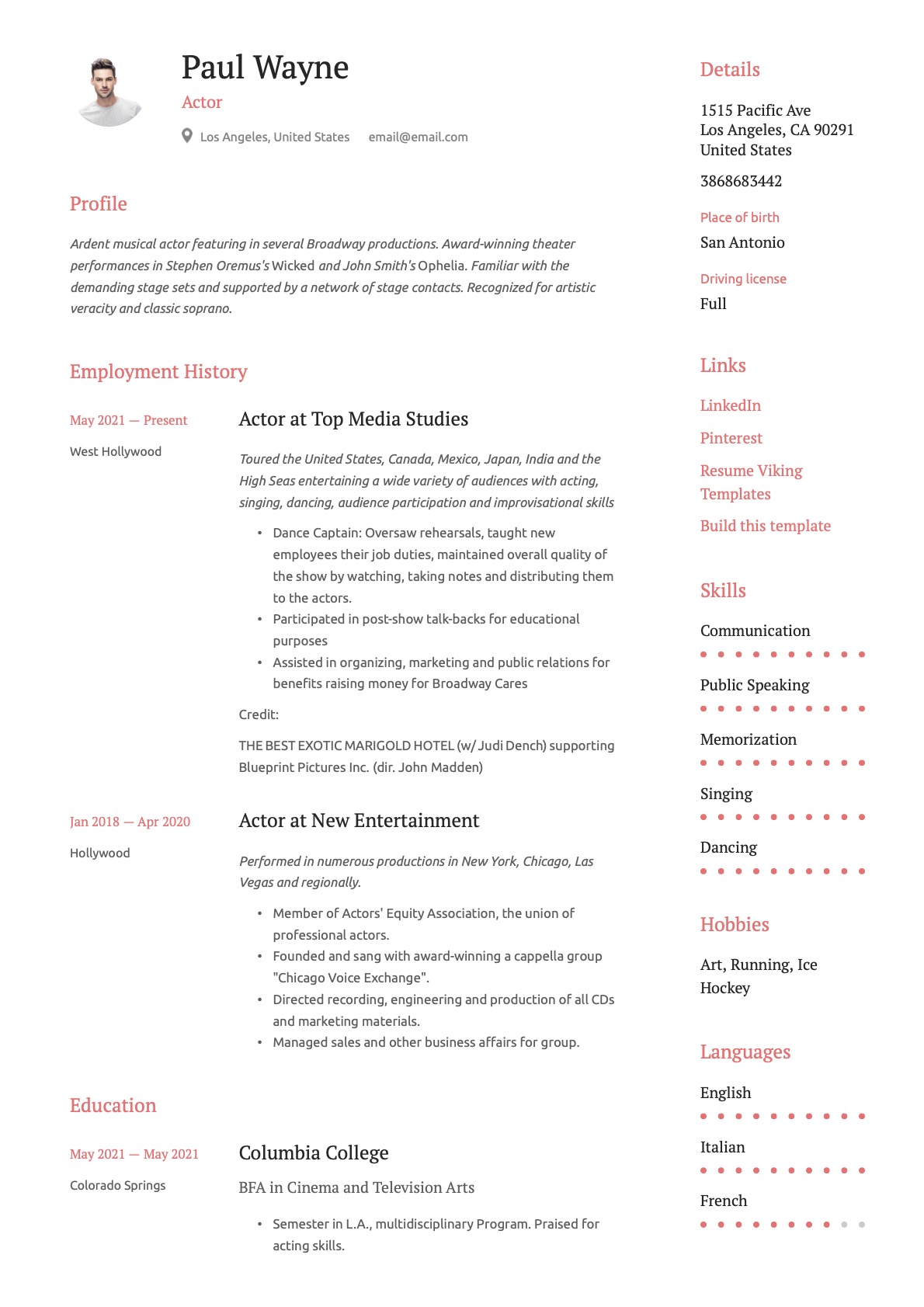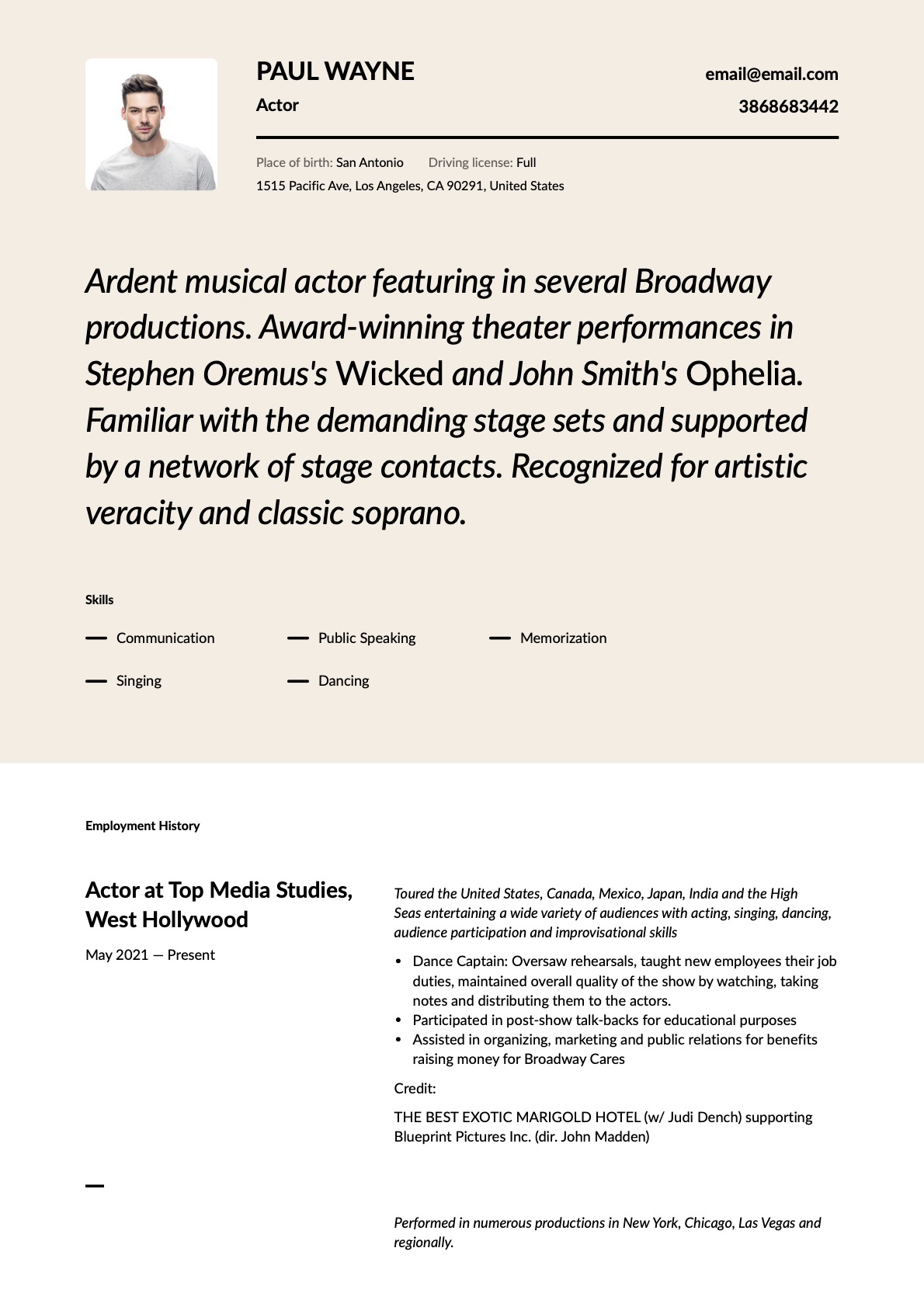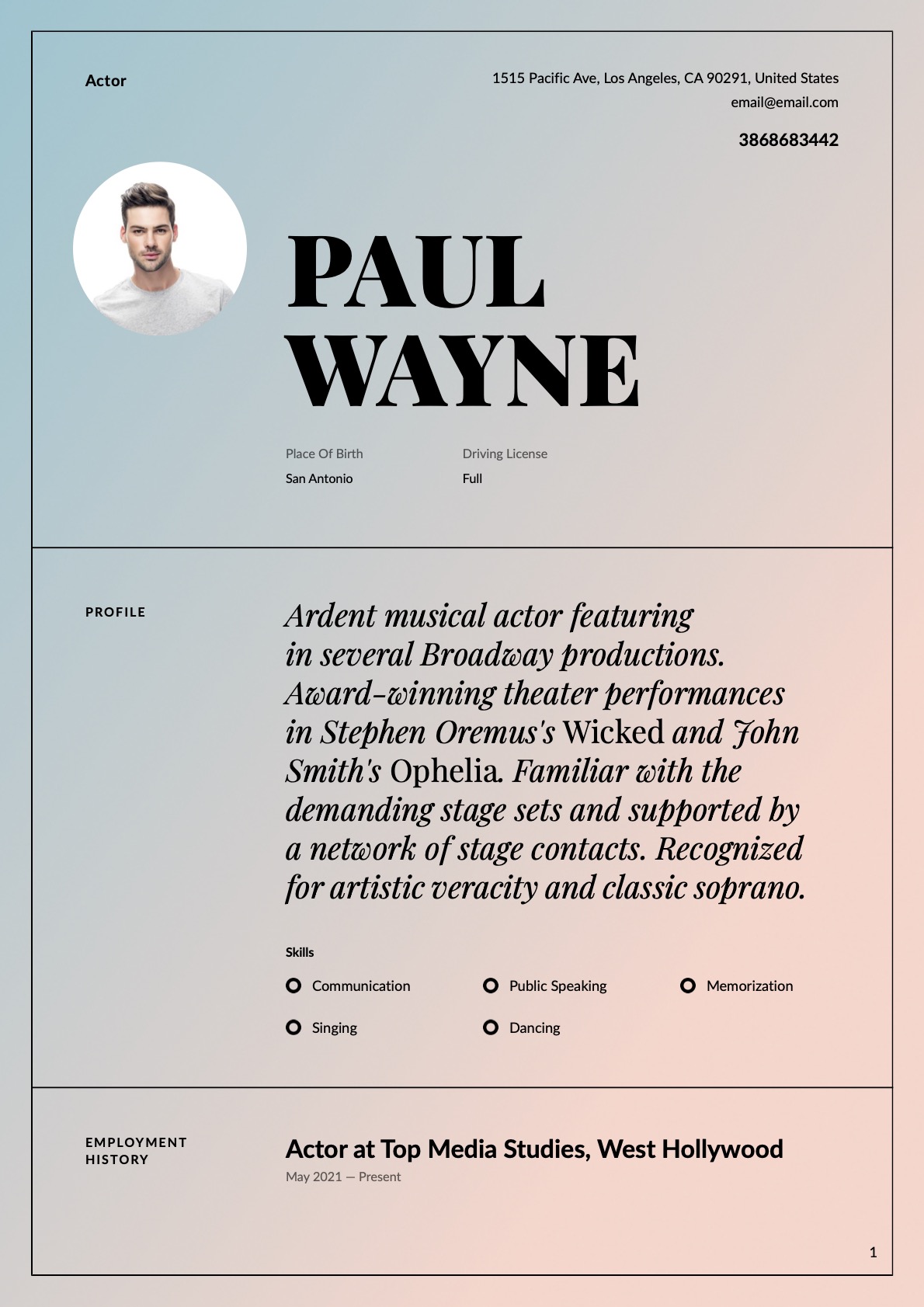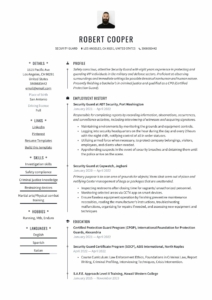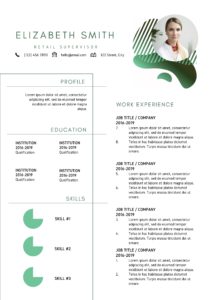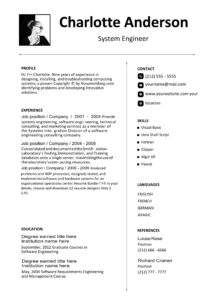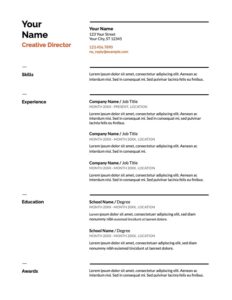When looking for your next/ first acting job, checking out what a proper Actor Resume should look like is a clever move! So, take your seats because everything you need to create the perfect resume is about to hit the stage!
We're not looking to burst any bubbles here, but if you think all you need to land a part are things like great drama training, beauty, and a savage fitness routine, you're wrong.
Carry on reading because we have everything you need below to land your dream role with our Guideline on how to create an Actor Resume.
What you can read in this article
20 Actor Resume Examples
(Free sample downloads are at the bottom of this page)
Actor Resume Writing Guide
Resume Sections
- Contact information
- Career Objective & summary
- Employment History
- Achievements
- Education
- Skill Section
- Certification & Licensing
- Extras: Languages/Awards/Publications/Volunteering/hobbies
- > Professional information
1. Contact information
- First Name and Last Name
- Physical Address
- LinkedIn Profile / Portfolio Link
What to Highlight in an Actor Resume
Let's be real. This industry is cutthroat. It's not easy landing a role, and you don't get to Morgan Freeman level overnight. Your resume is much like a film treatment. If your resume is boring, the recruiter will drop you like a squat. Get it right, and one day you may just start a speech with “I'd like to thank…” holding an Oscar.
This kind of resume is a little different from your usual resume. It focuses on those trying to land a job in television, film, theater, or other acting media, so it typically has your headshot, and everything must be one page. Even more crucial than your face, though, is that your resume must show how serious you are about this job.
If your resume has a crappy format, you won't be taken seriously and dropped in the “no” pile. We suggest the reverse-chronological format, as it is respected and shows your most recent info in the best way.
Only ever use clear, simple fonts and keep your writing concise.
Your resume should be the same size as your headshot, which is about 8 inches by 10. This is crucial if you plan to audition for roles in the big markets. If your headshot doesn't fit the industry format, you may as well wear a shirt saying, “just left the farm.” Photographers in the fancy markets generally stay on top of what's current in this regard, so it's best to ask around to see what's trending now. You must be sure what you do is what recruiters expect to see.
And we mean, like really sure. But, because you only get one chance at a first impression, don't use a random photographer, please! You'll be seen as a greenhorn right off the bat.
Adding a Headshot to an Acting Resume:
If you want it to look professional, spend a little extra cash having it printed back-to-back. That way, the corners won't peel off, just like when you used glue in your junior school days. Also, DO NOT use a paperclip! They will get separated.
*Pro Tip: Should you choose to print the resume behind the headshot, print in smaller quantities to avoid throwing away unnecessary headshots when you must update the resume.
As your experience increases, take out any amateur entries. Professional credits always go first, obviously, followed by educational info and then community theater info.
*Another Pro Tip: Have your resume double-checked for any spelling/ grammar errors. You could have the best resume in the world, but if there's a grammar error, it doesn't matter.
Lastly, save the resume as a PDF to ensure it is compatible with every device.
2. Career Summary & Objectives
If done right, this section may be the difference between an interview and nothing at all. It gives the recruiter an idea of who you are, your proficiencies, and if your resume is worth pursuing further.
Jot down everything you're good at regarding your career/ skills. This is essentially a 3-5 sentence summary of your entire resume. It must correspond to the job advert, be punchy and eye-grabbing.
But how do you know which to write? A summary or objective?
A summary provides proof of your experiences and that you're ready for the big break in your career. Basically, if you have loads of experience, write a summary. An objective shows your commitment, ambition, and passion. This is ideal for someone with little/ no experience.
Examples
Actor Summary 1
“Gifted child actor with over four years of professional experience in stage, Film, and commercial acting. Highly spirited and cooperative team player used to the most demanding sets, including Game of Thrones. Award-winning theater performances in Matilda and Hamilton.“
Actor Summary 2
“ Impassioned actor combining recognized BFA education and considerable professional work in television and stage acting. Supported by a network of screen and stage contacts, with a reputation for artistic veracity.“
Actor Summary 3
“Ardent musical actor featuring in several Broadway productions. Award-winning theater performances in Stephen Oremus's Wicked and John Smith's Ophelia. Familiar with the demanding stage sets and supported by a network of stage contacts. Recognized for artistic veracity and classic soprano.“
Actor Summary 4
“The hard-working actor with 6+ years experience in productions like Game of Thrones and Stranger Things. Looking to portray Shanira in The Walking Dead. Has broad theater experience in productions such as Native Son and special skills in singing, dance, and screenwriting.“
3. Employment History
Acting needs you to adapt your skills to the demands of the role. Providing your acting experience history is like that too.
Categorize your types of acting experience. For example, if you're auditioning for a theater play, give all your theater experience first. Don't stress about chronological order here.
For every category, put your best acting credits first up. Credit dates aren't usually included, so leave them off.
This is how to put your acting credits in an audition resume:
HAMLET Laertes Gotham Film Festival (John Snow, Director). New York, NY.
For those of you who are new to this, no recruiter cares if you helped the lighting crew or have good team skills. So don't bother providing those details.
The accepted format of the industry is to utilize columns when listing the title of the play, the character's name (the role you played), theater company, and director. If it was outside your current state, provide the details of the state it was in.
Should you have little acting experience, panic, not a young grasshopper. You can list scene work from your acting classes. For example:
HAMILTON Angelica Rambo Drama Workshop
(dir. Sylvester Stallone)
Suppose you haven't reached the level of car chase scenes or punchy series yet. No stress. Just provide scene work from your acting classes.
Scenes from SEINFELD lead, advanced acting for film class (dir. Susie Rose).
If you have worked together with a recognized actor/ actress, include their name after the title. Example:
THE BEST EXOTIC MARIGOLD HOTEL (w/ Judi Dench) supporting Blueprint Pictures Inc. (dir. John Madden). Absolute classic, by the way.
As your experience levels increase and your progress, you must make several acting resumes that target specific industries and role types.
An actor/ actress with little experience will probably have to cover your credits in one category, maybe theater. Those with more experience will need to split “theater” into subcategories:
- Off-Broadway
- Broadway
- Shakespeare
- Regional Theatre
- Musicals
It's the same for Film. Actors/ actresses with little experience might only add Film as a singular category, but those with more experience may split their credits into:
- Short Film
- Feature Film
- T.V. Series
- Documentary
- Soaps
- T.V. Movies
Lastly, remember the rule of honor. Listing the name of the character you played isn't always necessary. You can, instead, list the type of role. See the list below for examples.
Speaking Roles to be Included in your Professional Acting Resume:
- Lead: female/ male, protagonist/ antagonist, most significant role in the show/ movie.
- Principal: with recurrent scenes opposite lead to development storyline.
- Supporting or Day Player: normally limited to a few lines only.
- The Voice-Over Artist: unseen individual doing the
Non-Speaking Roles to be Included in your Professional Acting Resume:
- Featured: non-speaking, lending believability to the scene (bartender, driver, SWAT team, etc.)
- Extra: usually used to enliven a scene (office worker, pedestrians, audience member, etc.)
- Stunt Performer: the professional actor who performs stunts.
- Stand-In: similar physical assets of the actor, taking the actor's place during the drawn-out setup of the scene.
- Body Double: typically, body doubles are required for scenes needing nudity or depicting physical fitness.
- Stunt Double: professional actor who only takes the part of another actor when stunts must be done.
*Pro Tip: Think about removing the high school and community theater credits after starting an undergrad program. After you've had a few years of professional work, take college credits off your resume.
Still a bit stuck? – use this stock standard format
Examples
Professional Actor with Top Media Studios
(Jan 2021 – Current)
Toured the Canada, United States, Mexico, Japan, India, and the High Seas, entertaining a wide variety of audiences with acting, singing, dancing, audience participation, and improvisational skills
- Dance Lead: Oversaw dress rehearsals, taught new employees their job duties, maintained the overall quality of the show by assessing performances, taking notes, and distributing them to the stage actors.
- Participated in post-show talk-backs for educational purposes
- Assisted in organizing, marketing, and public relations for benefits raising money for Broadway Cares
Junior Actor with New Entertainment Inc
(Dec 2018 – Dec 2020)
Performed in several productions in New York, Chicago, Miami, Las Vegas, and regionally.
- Member of Actors' Diversity Association, the union of professional stage actors.
- Founded and sang with award-winning acappella group “Chicago Singing Exchange.”
- Directed recording and production of all CDs and marketing materials.
- Managed sales and other business activities for the group.
Job Descriptions Examples
Below are several general duties a recruiter would expect to see in your resume, regardless of your experience and special skills. Use these to craft your job description section, or at least as a guideline.
Examples
- Responding to requirements and starts educational theatre programs participation in applicable school, internal, and community activities. Securing bookings and maintaining scheduling of the touring programs calendar.
- Serving as a facilitator and actor in several programs and several roles. Facilitating workshops.
- Working independently and maintaining responsibility for communications and project deadlines.
- Incredible character acting skills.
- Exploring and developing new themes, ideas, and characters within theatrical performances under the direction of the Performance Manager.
- Attending workshops to develop new ideas and themes.
- Ensuring you perform as specified by the script and that it is sanctioned by the Performance Supervisor if there is any variation.
4. Accomplishments
This section is all about marketing yourself. Brandishing your accomplishments in their own section is critical to set you apart from the competition. You must show the recruiter what you've achieved, not the duties you've done in past roles.
The cherry on top for this section is making sure you quantify your accomplishments. You must provide numerical values to prove your claims. Quantification has been proven to increase the probabilities of landing interviews.
Basically, the idea is to think of things you have or be a part of that make you proud and translate that into a punchy sentence with numbers/ values to back it up. Of course, you must also add awards. The thing is, some awards mean more than others, so how do you know which ones to add?
Stay clear from awards driven by social media where actors/ actresses ask for votes from friends and family. That's some backwater award right there, especially if you're planning to enter the big leagues. They don't care about those.
Include the awards where voters are peers of the industry evaluated for professional associated experience and qualifications.
Below is a list of acceptable U.S. Acting Awards on an Actor's Resume:
- Emmy
- Academy Award
- Golden Globe
- TONY
- Drama Desk
- Outer Critics Circle
- Drama League
- Lucille Lortel
- Obie
- Grammy (only for a spoken/ solo recorded performance of a role)
Below is a list of acceptable Regional Acting Awards to be included in an Actor Resume:
- Ovation (Los Angeles)
- Joseph Jefferson (Chicago)
- Helen Hayes (Wash, DC.)
- Carbonell (Florida)
- Elliot Norton (Boston)
- Barrymore (Philadelphia)
- Ivey Awards (Minneapolis- St. Paul)
- IRNE (New England/ Boston)
- Kevin Klein (St. Louis)
If it's a banger of an award, make sure to put it straight under its related credit in italics to ensure the recruiter doesn't miss it.
An example would look something like this:
- Played the lead role in (insert movie/ play/ tv role here), which levelled $256M at the box office in 2016, leading to being awarded a Golden Globe for best main actress.
- Contributed to 8 Films, 5 Commercials, various plays ranging from Paredy to Comedy, a web Youtube series, and hosted a reality television show.
- Awarded with Official Selection Prize in The Atlanta, [company name]
- Nominated Best Actor in Cannes Film Festival 2010
- Rated IPN's #3 Best Fan Film 2009
5. Education Section
“But bro, wait. I'm an actor/ actress. I don't actually need formal education, surely”. Fam, you are wrong.
It's essential to include your formal education and training in your resume. It gives you a little more oomph to your resume to stand out, especially if you don't have much to offer in terms of experience.
New actors, we are looking at you people!
So, begin your education section with the essentials:
- Years studying
- Degree
- College Name and Location
Dates only really need to be mentioned in this section. Follow them with details of your acting education. This section also shows your willingness to engage and your passion for what you do.
But should you not have any formal education, fret not. Just add:
- Seminars
- Acting-related workshops
- Masterclasses
- Ongoing studio classes
- Private coaching obtained outside a university setting
If you have training in related fields like singing, music, dancing, stunts, martial arts, etc., then add them! Include any formal training at acting-related colleges.
*Pro Tip: To make recruiters sit up and notice, throw some names around. Suppose you went to any recognized teachers, studios, or coaches, including the names. Also, mention the time frame you spent training in a certain area, discipline, or technique.
Examples below:
2011- 2013 BFA in Cinema and Television Arts. Columbia College.
- Semester in L.A., multidisciplinary Program. Praised for acting skills.
- Excelled in acting and directing coursework.
- Held leading role in 2 school theatre productions.
2014- 2016 Bachelor of Arts, Theater, and Acting. The University of California, San Diego, California. GPA of 3.7.
2015- 2019 High School Diploma. West Linn High School. West Linn, Oregon. GPA of 3.4.
6. Actor Resume Skills
This section doesn't change much from other professions. You have certain important technical competencies, but you mustn't forget your soft skills and interpersonal traits.
To be noticed, you must beat the Applicant Tracking Systems (ATS) and screening bots. This is because they recognize specific keywords and phrases in your resume that relates directly to the job you're applying to. That's why it's important to use the same words from the job ad in your resume when listing skills.
This industry is all about standing out from the crowd, especially if you're a little light on the experience side. Check the job advert for the skills they want, and then list your main attributes that are in line with these skills. You may categorize your skills like this:
Industry-specific skills
| Memorization skills | Voice modulation | Understanding of dramatic techniques |
Soft skills
| Detail-oriented | Dependable | Adaptable |
Special skills
| Accents | Combat Training | Level of Fitness |
| Singing | Fluency in another Language | Dancing |
| Musical Instrument |
7. Qualifications & Certifications associated with Actors
| The Actor's Workshop, 2016 to 2018 | Viscount Dance Studio, 2014 to 2015 | France School of Dance, 2015 to 2016 | Oregon Music Academy, 2018 to 2019 |
| Foreign Language; Level 8 – Spanish | Foreign Language; Level 8 – Italian | Foreign Language; Level 4 – French | Advanced Script Writing |
Optional Extras for Actors
At this level, you must understand all obligations that accompany the role you want. You may be experienced due to past roles, but you must be aware of all nuances that accompany different roles and levels of acting.
Honesty is your best friend here. Recruiters seldom get you to prove all the skills you list but are aware of listing many weird and wonderful things you cannot actually pull off.
And we don't mean you must simply list hobbies. Things like dialects and accents are risky but great ones to have on the extras list. Please don't mention them unless you've had formal training though, watching all Harry Potter movies doesn't make you an expert in the British accent.
Check out the role specifications, including the most essential in a special section in the resume. You must prove you fit this role tighter than Spiderman's spandex.
Professional information for Actors
Sectors: Online Media, Advertising, Media, Promotions, Marketing, Broadcasting, Film, Television, Entertainment
Career Type: Professional, Networking, Campaign Management, Advertising, Analytics, Copywriting, Blogging, Vlogging, SEO, SEM
Person type: Impersonator, Creator, Debater, Persuader, Marketer, Promoter, Influencer, Networker, Communicator, Negotiator, Analyzer, Facilitator, Story Teller, Scheduler.
Education levels: Bachelor level to Masters' Degree, Post-School Certifications
Salary indication: Average salary varies depending on film type and reputation
Labor market: Expected growth of 3% between 2019 – 2029 (BLS)
Organizations: Media, Production, Broadcasting, Education and Entertainment Enterprises
Download Actor Resume Templates
